The UAE's oldest Russian school has left politics at the school gate as war rages in Ukraine.
The Russian International School in Dubai serves close to 500 pupils from 24 countries, including Russia, Ukraine, Belarus, Uzbekistan and Kazakhstan.
The 27-year-old school has welcomed about 100 new pupils since January, with most hailing from Russia.
Most pupils have been with the school, located in Dubai’s Muhaisnah area, since kindergarten.
a Ukrainian teacher
They told The National their friendships will outlast the devastating war that has killed tens of thousands on both sides.
The private school follows the Russian federal curriculum with Russian as the main language of instruction.
Inclusive environment
Pupil intake since the start of the year has surpassed expectations with more families moving to Dubai due to the war in Ukraine.
“It has almost been like two enrolments,” said principal Marina Khalikova.
“One intake usually happens in September and then it’s like we had a second in January.”

New pupils, particularly those who fled conflict areas, did not always have all documents required.
UAE authorities permitted admission so the children did not miss the academic year.
“The KHDA has allowed us to enrol the refugees,” Ms Khalikova said, referring to Dubai’s school regulator, the Knowledge and Human Development Authority.
“They can get enrolled even if there is a delay in receiving their documents.”
From the early stages of the invasion in February 2022, the administration took no chances and asked pupils to limit discussions on the war.
Camaraderie amid conflict




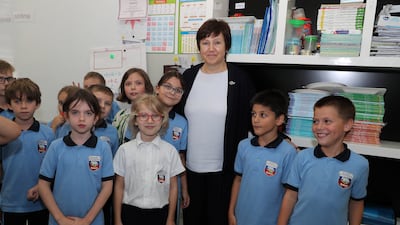

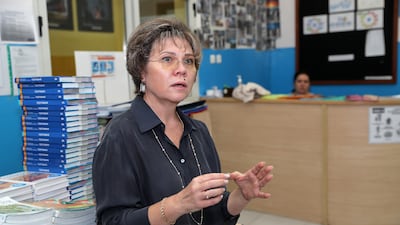
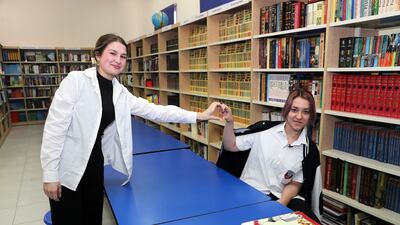

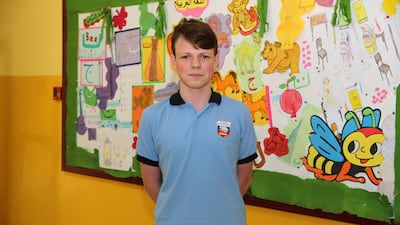

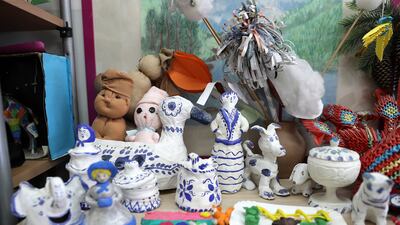
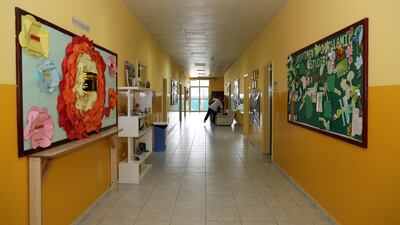
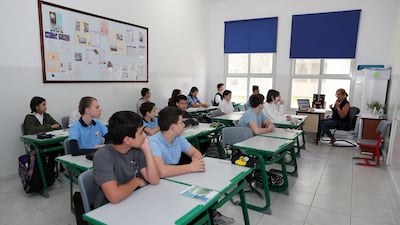
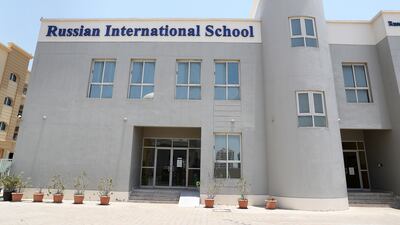



“Our school is outside politics,” Ms Khalikova said.
“It was crystal clear from the beginning that there should be a dialogue between the school management, teachers, students, parents and families.
“We had a diplomatic talk where we clearly specified the status of the school, that we promote inclusion, tolerance and friendship.
“We explained we are here to teach.
“This is a small community and our task is to develop every personality.”
Senior pupils initiated an anti-bullying campaign and organised tolerance and international friendship days to drive home the message.
Ms Khalikova asked them to appreciate the unique position of living overseas.
“Our message to families is that no matter the country you come from, your children have a unique opportunity to study in a multinational community,” she said.
“Each family is far away from the motherland but every student’s well-being is important.”
Creating a world of peace
Marina Cherkasova, a Ukrainian teacher from Mariupol, said while it was impossible not to be affected by the situation unfolding in her home country, the aim was education.
“Our school is a no-politics zone,” said Ms Cherkasova, who has lived in the UAE for 22 years.
“We should not cause any pain or any trouble to anyone – Russians or Ukrainians.”

The history and social studies teacher has friends in Russia and in Ukraine whose children are serving in the army.
“It is a tragedy for all, not just for people who live there,” she said.
“But in this school we can make a little world of peace.
“In the UAE there are so many nationalities, it is common sense that if we live here, we must live together in peace.”
Having taught in the school since 2006, she has an emotional connection with pupils she has seen grow up.
The challenge is assimilating pupils who are new to the UAE.
“I have known most children from age seven and they know me,” she said.
“They feel the school is their second home and know the teacher is their friend.
“But the new children who come to our school from Russia or Ukraine after the war began – it will take some time to know them well.
“There are no cultural conflicts but there can be miscommunication or misunderstanding because the kids are new.”
Friendships will outlive war
Sofia Savula, 16, a grade 10 pupil, is also from Mariupol – a city that suffered bombardment and shelling by Russian forces.
The Dubai-born teenager said the war will not alter old friendships.
“I feel sad and exhausted at what is happening – my relatives live in Ukraine,” she said.
“But I have lived here [Dubai] my whole life and both Russian and Ukrainian people are sad.

“Nationality is not a reason to bully and not to talk to each other.
“I believe you should not humiliate people because of the country they are from.
“You have to pay attention to their character and your common interests.”
As she struggled to control her emotions, a girl from Belarus walked over making a heart sign.
“I really love my classmates,” said Sofia, who plans to go to university in the UAE.
Still, she makes sure to steer clear of political discussions “because it will ruin our friendship”.
Maria Vlasenkova, 17, a grade 11 Russian pupil, recalls seeing Ukrainian classmates cry as news of casualties emerged.
“I saw a girl from grade seven crying and I hugged her. I tried to comfort her,” she said.
“She is from Ukraine and I’m from Russia but we did not scream at each other.
“We understand that each of us loves our country but we cannot argue about the situation here.”
Compromise and communication
Russian pupil Maxim Davidson, 17, from grade 11, has a close Ukrainian friend and they often speak about how dialogue is vital.
“I’m a patriot and he is also a patriot,” Maxim said.
“We are such close friends and we believe you need to shake hands and find a solution.
“He is my childhood friend – I would never do anything to betray him and he would never do anything to betray me.
“So it’s important to always stay human and this is what our school teaches us whatever problems exist.”
Pupils insist there is no censorship and say they prefer not to debate the impact of the war.

“Our school isn’t censoring things, we are allowed to talk about it,” he said.
“It’s not like you talk about it, you will get detention.
“But it’s better to keep peace with everyone.”
He believes studying in a multicultural school inspires transformation.
“The goal of a school is to help prepare us so in the future we can change things,” he said.
“We should be able to prevent situations like this from ever happening again.”
Finding the middle ground was key for Lizaveta Papova, 17, a grade 10 pupil from Belarus.
“I have friends from Ukraine, Russia, some feel sad because their family live there,” she said.
“We try to calm them down, tell them that everything is going to be okay.
“When we talk about the situation we always find a compromise or try to find a way to help each other deal with it.
“We just want to have good friendships.”


